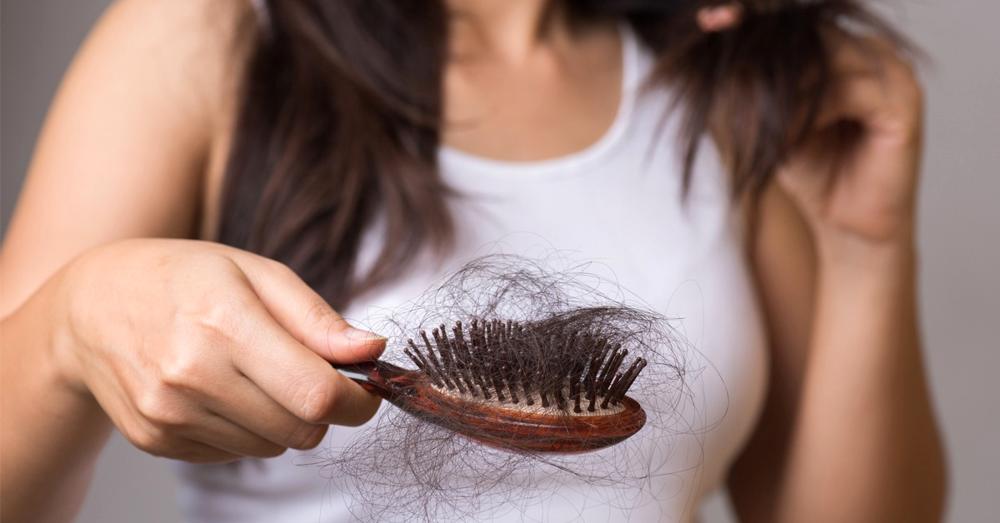
Playing with my hair is a constant bad habit of mine. I pull my curls to watch them spring. I run my fingers through my woolly mane until I hit a snag (which inevitably happens). I undo my bun or ponytail just to put my hair up again. I’ll start braiding my hair just because. It doesn’t matter if I’m mulling over a turn of phrase or waiting for my coffee to brew — I’m worse than Ariel in The Little Mermaid. In my defense, giving in to my hair-tugging habit means that I know exactly how thick my ponytail should be. And when it comes to monitoring hair loss, Jamie-MacKelfresh, assistant professor of dermatology at Emory Healthcare in Atlanta, thinks that’s a good thing.
“We’re all used to our hair’s thickness, the size of our ponytail, what’s in our hairbrush,” she says. “When there’s a sudden 25 to 30 percent decrease in the size of your ponytail, then you need to see a doctor.”
Less than that is likely trivial, she says. In fact, you probably shed between 50 to 100 hairs per day without even noticing. What you have to watch out for is more dramatic hair loss, which may “seem pretty alarming” at first, says MacKelfresh, but can usually be traced back to reasonable life changes and cease after three to six months.
Occasionally, using new products or processes will make your hair more fragile and therefore susceptible to breakage, but it shouldn’t actually fall out. If your hair is thinning after you use hair dye or get a perm, MacKelfresh warns that there is another problem. These are the four main reasons your hair may be falling out:
1. Genes
“Hair loss typically occurs in older women, but it’s still possible for it to happen to women in their teens, 20s, or 30s,” MacKelfresh says. Sometimes premature hair loss is just hereditary and your hair will not regrow on its own. What’s more likely is that you will experience hair loss gradually over time, from your twenties until your seventies. “From your 20s to 30s, you shouldn’t notice a huge decrease in hair density,” she says. But if you do, make a doctor’s appointment.
2. Stress
While everyday stress and the occasional all-nighter at work aren’t likely to cause hair loss, major events such as surgery, a very drastic change in your regular diet or sleeping habits, or an emotional ordeal (for example, a bad divorce or a death in the family) all can. The good news? It’s most likely temporary, and as soon as you pinpoint the specific stressor and address it, your hair should grow back.
3. Hormones
Whether you change your oral contraception pill or get pregnant, your body might cope with telogen effluvium (the fancy way of saying “excessive shedding”). “It’s especially common after childbirth,” says MacKelfresh. Almost half of all new mothers see such shedding about one to five months after their baby is born, but it is only temporary as their increased levels of estrogen while pregnant lead to less shedding of hair as they come to term and does not lead to permanent hair loss (no matter how much your little one is driving you crazy).
4. Illness
It’s less likely but still possible that hair loss is a sign you’re suffering from anemia, thyroid disease, autoimmune conditions such as alopecia, cancer, or other illnesses, MacKelfresh explains. But if the aforementioned reasons don’t seem to make sense, it can’t hurt to get screened. If nothing else, ruling out a major illness can give you peace of mind.
Depending on the cause of your hair loss and your body, minoxidil (a topical treatment commercially known as Rogaine) will probably be the first thing to try, according to MacKelfresh. “It works to prevent hair from getting thinner and builds density over time,” she says.
For more serious cases, there are pills and hair transplants. But you won’t know what will work for you until you — you guessed it — see a doctor.
“If you’re thinking there’s more than normal hair loss, it’s always better to be safe than sorry,” MacKelfresh says. “Preventing further hair loss is easier than magically regrowing hair.”
Related from FoxViral: Top Effective Ways to Regrow Hair Naturally

